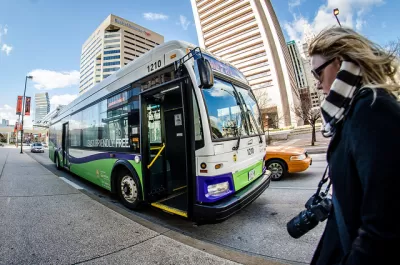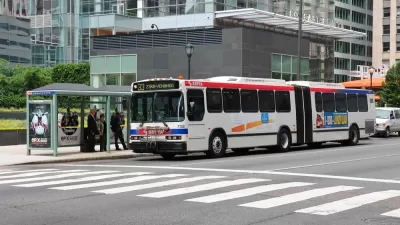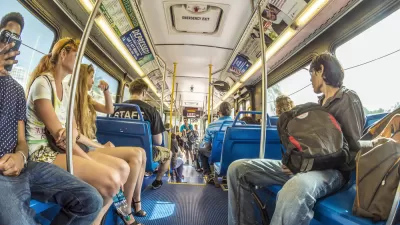With federal infrastructure funding on the table, local leaders are calling for a comprehensive strategy to improve the region’s public transit.

A group of civic leaders in Baltimore is calling on the city and the region to develop a comprehensive vision for the region’s mass transit—before federal infrastructure funds dry up. As Bruce DePuyt reports in Maryland Matters, “Their campaign, called Baltimore’s Transit Future, hopes to unite elected leaders, the business community and the public in support of a long-range plan to expand bus and rail service. They also want to make existing service more reliable.”
According to the article, “The effort will be shaped by six ‘pillars,’ which will include reducing the repair backlog, improving access to job centers, equity and the development of a 10-year ‘Rapid Transit Expansion Program.’” DePuyt notes that “Baltimore’s rail system pales in comparison to Metro, the commuter rail network in the Washington, D.C. region, even though both were launched at the same time. The region’s bus network performs below cities of comparable size.”
The campaign emphasizes that “As the region tries to bounce back from the pandemic, and with significant expansion underway at Tradepoint Atlantic, business leaders said the region is being held back by its substandard bus and rail operations.”
“Passage of a federal infrastructure bill has spurred conversations about the need to improve transit in Baltimore, with many advocates arguing for the creation of an authority similar to the Washington Metropolitan Area Transit Authority (WMATA).” DePuyt points out that “Leaders of the Baltimore’s Transit Future campaign said they are not endorsing the authority concept, nor have they coalesced behind any particular modes of travel or routes.”
FULL STORY: Baltimore Must Embrace Transit Vision While the Feds Are Flush With Funds, Groups Say

Planetizen Federal Action Tracker
A weekly monitor of how Trump’s orders and actions are impacting planners and planning in America.

Chicago’s Ghost Rails
Just beneath the surface of the modern city lie the remnants of its expansive early 20th-century streetcar system.

San Antonio and Austin are Fusing Into one Massive Megaregion
The region spanning the two central Texas cities is growing fast, posing challenges for local infrastructure and water supplies.

Since Zion's Shuttles Went Electric “The Smog is Gone”
Visitors to Zion National Park can enjoy the canyon via the nation’s first fully electric park shuttle system.

Trump Distributing DOT Safety Funds at 1/10 Rate of Biden
Funds for Safe Streets and other transportation safety and equity programs are being held up by administrative reviews and conflicts with the Trump administration’s priorities.

German Cities Subsidize Taxis for Women Amid Wave of Violence
Free or low-cost taxi rides can help women navigate cities more safely, but critics say the programs don't address the root causes of violence against women.
Urban Design for Planners 1: Software Tools
This six-course series explores essential urban design concepts using open source software and equips planners with the tools they need to participate fully in the urban design process.
Planning for Universal Design
Learn the tools for implementing Universal Design in planning regulations.
planning NEXT
Appalachian Highlands Housing Partners
Mpact (founded as Rail~Volution)
City of Camden Redevelopment Agency
City of Astoria
City of Portland
City of Laramie





























